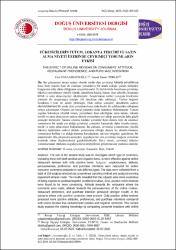Tüketicilerin tutum, lokanta tercihi ve satın alma niyeti üzerinde çevrimiçi yorumların etkisi
Citation
Ustaahmetoğlu, E. & Toklu, İ.T. (2023). Tüketicilerin tutum, lokanta tercihi ve satın alma niyeti üzerinde çevrimiçi yorumların etkisi. Doğuş Üniversitesi Dergisi, 24(2), 605-622. https://doi.org/10.31671/doujournal.1140094Abstract
Bu çalışmanın amacı sadece olumlu tonda olan çevrimiçi lokanta yorumlarına
karşı hem olumlu hem de olumsuz yorumların bir arada olduğu yorum türünden
hangisinin daha etkin olduğunun araştırılmasıdır. İki farklı türde hazırlanan çevrimiçi
tüketici yorumlarına yönelik olarak; deneklerin kuşku, tutum, ikna edicilik, lokantayı
tercih ve satın alma niyetleri ölçülmüştür. Araştırmanın verileri kolayda örnekleme
yöntemi ile araştırmaya katılan 156 denekten elde edilmiştir. Veriler bağımlı
örneklem t testi ile analiz edilmiştir. Elde edilen sonuçlar, deneklerin sadece
olumlu/olumsuz bir arada olan yorumlara karşı daha kuşku ile yaklaşmakta olduğunu
ortaya çıkarmıştır. Olumlu çevrimiçi yorumlar daha inandırıcı bulunmuştur. Yorum
yapılan lokantaya yönelik tutum, yorumların ikna ediciliğine karşı tutum, lokanta
tercihi ve satın alma niyeti sadece olumlu yorumların yer aldığı senaryoda daha güçlü
sonuçlar üretmiştir. Sadece olumlu tondaki yorumlar hem olumlu hem de olumsuz
yorumların bir arada yer aldığı çevrimiçi yorumlar karşısında daha olumlu tutum,
tercih ve satın alma niyeti bulunmuştur. Bu çalışma, çevrimiçi yorumlarına yönelik
tüketici tepkilerini sadece olumlu yorumların olduğu durum ile olumlu/olumsuz
yorumların birlikte yer aldığı durumu karşılaştıran, mevcut bulguları genişleten, bir
araştırmadır. Bu çalışmanın sonuçları, uygulayıcılar için, çevrimiçi mağaza yorumları
üzerinde tekrar düşünmelerini gerektirmektedir. İlave olarak, çevrimiçi tüketici
yorumlarından etkilenen uygulayıcıların stratejilerini geliştirmesine yardımcı olabilir. The aim of the present study was to investigate which type of comments,
including those with both positive and negative tones, is more effective against online
restaurant reviews with only positive tones. Subjects’ suspiciousness, attitude,
persuasiveness, preference, and purchase intentions were measured for online
consumer comments prepared in two different types. The data were collected from a
total of 156 subjects selected via convenience sampling method and analyzed running
dependent sample t-tests. The results revealed that the subjects were more suspicious
of being exposed to positive/negative combined reviews. Also, positive online reviews
were found to be more convincing. Attitude towards the restaurant where the
comments were made, attitude towards the persuasiveness of the online reviews,
restaurant preference, and purchase intention produced stronger results in the
scenario where only positive comments were present. Only positive online reviews
produced more positive attitudes, preferences, and purchase intentions compared
with online reviews that included both positive and negative comments. The current
study expands the existing knowledge by comparing consumer reactions with online comments in two groups of only positive comments and positive-negative comments
together. Our findings invite practitioners to reconsider their online store reviews.
Additionally, it can help practitioners who are influenced by online consumer reviews
develop their professional strategies.


















